
- This event has passed.
Lost in Transition: 30 Years of the Russian Constitution and the Path to Autocracy
December 12, 2023 @ 6:00 pm – 7:30 pm
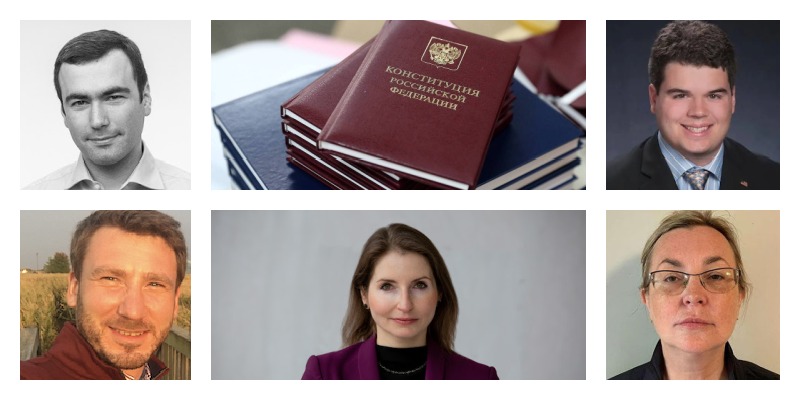
Please join the Russia and Eurasia Program at The Fletcher School for a panel discussion marking the 30th anniversary of the Russian constitution. The conversation will cover the political trajectory that Russia has taken since 1993 and what its future may hold.
We will explore how Boris Yeltsin’s presidency and the 1993 constitutional crisis contributed to the decline of democracy in Russia. We will also discuss the influence of Western constitutional expertise on Russian democracy, highlighting how international legal assessments have interacted with Russian politics and constitutional amendments. Furthermore, we will examine the role of the nomenklatura in Russia’s political evolution, assessing how the lack of elite turnover after the collapse of the Soviet Union set the stage for re-autocratization, and the use of constitutional federalism in Russia as a tool for maintaining authoritarian legitimacy, exemplified during crises like the COVID-19 pandemic and the Russia-Ukraine war.
The conversation will be moderated by Arik Burakovsky, Assistant Director of the Fletcher Russia and Eurasia Program. The event is open to the public, and refreshments will be served. Please make sure to register via Eventbrite to attend the event in person. If you would like to attend via Zoom or submit discussion questions for the panelists in advance, please do not hesitate to reach out to us.
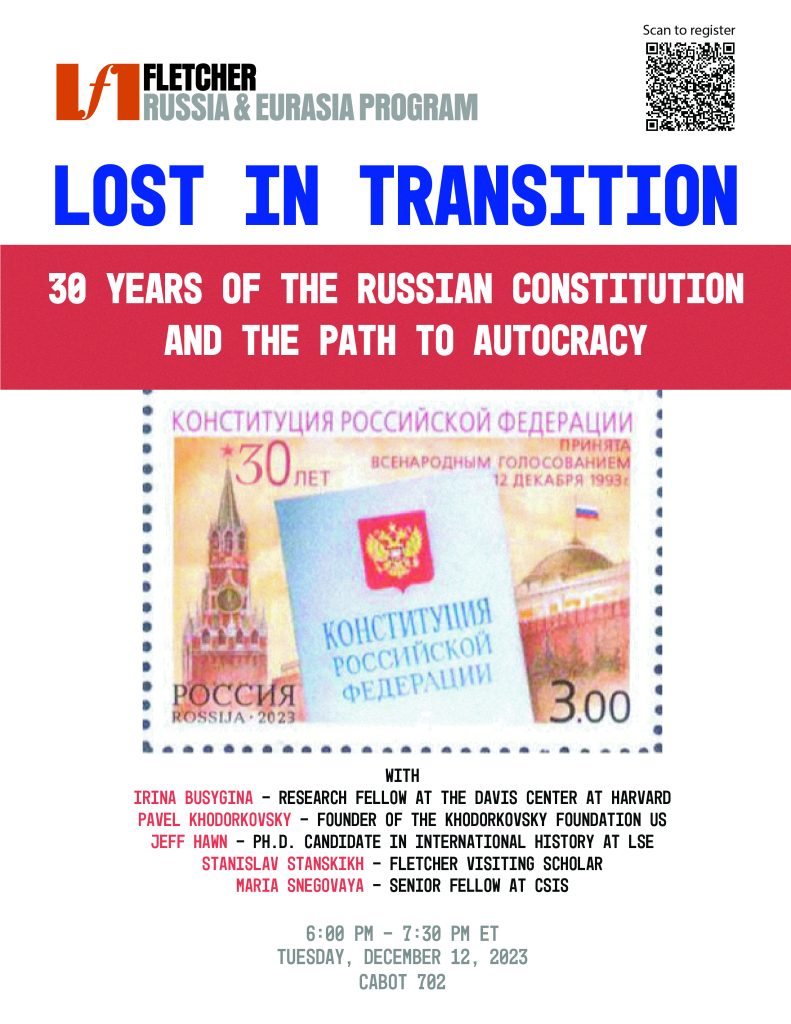
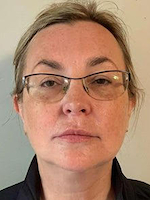 | Irina Busygina is a Research Fellow at the Davis Center for Russian and Eurasian Studies at Harvard University. She previously worked as Professor of Comparative Politics at the Department of Political Science and International Relations (Higher School of Economics at Saint Petersburg, Russia) and headed the Center for Comparative Governance Studies. Her research interests include comparative federalism and decentralization, Russian domestic and foreign policy, and Russia-EU relations. She has also been a visiting scholar Aleksanteri Institute, University of Helsinki (Finland), Uppsala Centre for Russian Studies (Uppsala University, Sweden), State University of New York (Binghamton, NY, USA), Centre for East European Studies (University of Regensburg, Germany), Slavic Research Centre (University of Hokkaido, Japan), Faculty of Political Science (University of Bergen, Norway). Her latest publications include center-regional relations in Russia. Her last book (co-authored by Mikhail Filippov), Non-Democratic Federalism and Decentralization in Post-Soviet States, was published by Routledge in November 2023. |
 | Jeff Hawn is a doctoral candidate in International History at the London School of Economics and Political Science. He is a guest teacher at LSE and instructs students on courses including War and Peace since 1914, Great Ideas in International Relations, and the History of the Soviet Union. The primary focus of his research is the failure of Russia’s democratic transformation in the 1990s. His Ph.D. dissertation, From Collapse to Crisis: The Fall of the Russian Parliament and the Constitutional Crisis of 1993, will be submitted in September 2024. He argues that between 1990 and 1993, Russia was on course toward becoming a genuinely democratic state, constructing government institutions and embracing the rule of law. However, the crisis in September and October 1993 would put an end to that and be a pivotal moment in shaping the post-Cold War world order, ensuring that Russia, after the collapse of the USSR, would remain first a managed democratic and then an authoritarian regime. Hawn holds bachelor’s and master’s degrees in international relations from American University in Washington, D.C. and a certificate in Russian studies from St. Petersburg State University in Russia. |
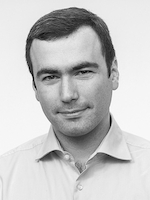 | Pavel Khodorkovsky is the founder of the Khodorkovsky Foundation US, a nonprofit organization focused on advancing parliamentary democracy and federalism through engaging policy experts, academics, and civil society leaders. Drawing on his 13 years of experience in the nonprofit and technology sectors, Pavel also serves as the Executive Director of Sunrise, where he leads a team that distributes crucial supplies to war-affected areas in Ukraine. Before joining Sunrise, Pavel co-founded and served as the CTO of Enertiv, a company that provides operations and energy management solutions for buildings. He also served as the president of the Institute of Modern Russia, an organization that seeks to promote the development of civil society in Russia by supporting the rule of law and strengthening relationships between Russia and other countries. |
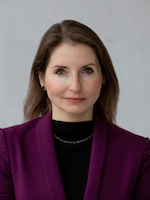 | Maria Snegovaya (Ph.D., Columbia University) is a Senior Fellow with the Europe, Russia, and Eurasia Program at the Center for Strategic and International Studies and a Postdoctoral Fellow at the Walsh School of Foreign Service at Georgetown University. She studies democratic backsliding and re-autocratization in post-communist and post-Soviet Europe, Russia’s domestic and foreign policy, and the tactics used by Russian actors and proxies who circulate disinformation to exploit these dynamics in the region. Her research results and analysis have appeared in policy and peer-reviewed journals, including West European Politics, Party Politics, Journal of Democracy, Post-Soviet Affairs, and the Washington Post‘s political science blog, the Monkey Cage. Her book on related topics, When Left Moves Right: The Decline of the Left and the Rise of the Populist Right in Postcommunist Europe, will be published by Oxford University Press in January 2024. |
 | Stanislav Stanskikh is Russia’s constitutional scholar in exile, human rights and anti-war activist, and legal expert on post-Soviet country conditions for U.S. immigration cases. After graduating from Lomonosov Moscow State University School of Law, he worked at the Government Relations Department of TNK-BP (Fortune 500) and served as the Executive Director of the Russian Foundation for Constitutional Reforms and founding Deputy Editor-In-Chief of the Russian Constitutional Court’s academic law review, among other positions. He was involved in civic protests and the anti-corruption movement in Russia, being an outspoken critic of Russia’s personalistic regime, the annexation of Crimea, and aggression in Ukraine. The escalation of repressions against intellectuals, human rights activists, and political opposition led to Stanislav’s political emigration from Russia to the U.S. He has been playing an active role in Russia’s democratic diaspora providing expertise to the Free Russia Foundation, the Free Russia Forum, and other diaspora organizations. In 2020, he initiated a popular petition campaign against amendments to Russia’s constitution. Currently, Stanislav is a Research Fellow at UNC-Chapel Hill and a member of the Post-Communist Politics and Economics Workshop at Harvard’s Davis Center. As a legal expert on country conditions, he closely collaborates with the Law Offices of Palant&Lust. |
